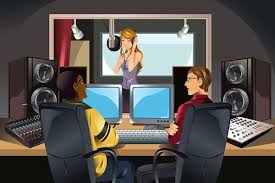
What Does Voice-Over Entail?
- It is important to have basic information on the topic at hand so you can understand why it is important for voice over artists to have certain qualities and how they come in handy in their line of work.
- If you don’t know already Voice-over, also known as off-camera or off-stage commentaries is a production process and technique were we incorporate a voice that is not part of the narrative in radio, television production, filmmaking, theater, or other presentations in form of a narration.
- What usually happens is, a voice-over artist or a specialist voice talent voices out a script on a recording instrument, sound engineers then synchronize this recording with either an already exiting voiceless video or a grid of motion pictures.
- The most common technique of voice-overs though is the synchronous dialogue one, where the voice-over is narrating the action that is taking place at the same time.
- Asynchronous dialogue, used in cinema, is usually pre-recorded and placed over the top of a film or video and commonly used in documentaries or news reports to explain information. There are different instances where one can use voice-overs, and this is from old messages, for motion pictures, and for announcements and information at events and tourist destinations. One can also use them during award ceremonies or during real-life events.
- It is very important to note that voice-overs are additions to pre-existing scripts, and one should not confuse it with replacing dialogue with a translated version, which is a process known as dubbing or re-voicing.
- In recent times we have seen how the demand for voice-over artists has grown in leaps and bounds. Every day, amateur and professional videographers, publishers, marketing agencies, and businesses publish thousands of hours of videos online. This results from how easy and inexpensive it is to create and distribute video content. Content that would have been on blogs for people to read is now being created as audio and video content and reaching a wider audience compared to the former. This means that more and more voice over artists are in demand because there is more work for them to engage in.
- It’s easier to have a lucrative career as a voice-over artist now than it was years back. Their demand is so high and they get handsomely compensated when in high demand.
Below we will look at different qualities that a voice-over artist should have and why it is important for them to have these qualities and why the availability of these qualities might determine their success or not.
What Are The Qualities of a Successful Voice-Over Artist?
You might wonder what does it take to be a sort after voice-over artist, it’s very easy if you have these following qualities.
1. Flexibility
You might easily be the best voice artist with an amazing vocal range, one who can experiment with his or her vocal cords and deliver on different characters and also be superb with your technical skills but without the ability to listen to a voice of reason and accept correction finding more projects to work on might prove difficult. The production team always wants to work with someone easy to work with and who listens to instructions. You might be perfect at what you do, but you find a client who wants to take a different route to bring their thoughts to life. If you are someone who is very stirring, it might be hard for production teams to work with you and since word goes around other production teams might not want to work with you because of your character. The most successful voice-over artists can accept direction and adapt on-the-fly, delivering exactly what a video’s director wants, whether that’s a neutral reading or an emotion-filled narration.
2. Vocal And Technical Skill
This has to be the first most important quality a voice-over artist must possess. Just like the name suggests, it shows that the essence of the job is all about voice, voice and more voice. A good voice-over artist must have a great voice and technical skill, which in this case, referred to as talent. Having a good voice is not enough, one has to practice and get more lessons on how to use their voice to bring out a scrip in the best way possible. We all know having an all-rounded person is a plus in businesses and cutting out losses so it’s advisable to not only have a good voice and know how to use it but also have a great understanding of your recording gear. Master your gear so that instead of worrying about room-hum, clicks, and echo, you can focus instead on the creative side of everything and should express even dull subjects in a way that catches the interest of listeners. It is very important for a voice artist to understand how to control his/her vocal cords and also technical skills to suit a particular character.
3. Friendliness
This is an important quality, not only for voice-over artists but also for everybody out there. It might not seem important at first, but eventually, it plays out when you realize you are a loner in your workplace. They say people help each other go places and move ahead in life, and thus why it is important to be a friendly individual. Whoever you are or whatever talent you have to whichever extent, if it’s hard getting along with people then going further in your career is something that you should not think about. Voice over jobs are usually on a referral basis and this ensures the success of different voice over artists. Building a close relationship with clients means that the same clients will look to work with you every time they have work done.
A good simple example would be, if I work with client A today and ensure I do my level best and perform well then I am guaranteed that client A will look for me the next time he has that same work and also recommend me to his or her friends for more work opportunities. Friendliness is a very important quality.
4. Reliability
You are good at what you do and have a lot of voice over jobs to do, but are you a reliable individual? Can someone count on you to deliver a perfect and well thought out job on time and with no delays? If you are not a reliable voice artist, then it’s time to change that because this might be what gives you a hard time establishing a reputation as someone directors want to work with. Everyone needs someone they can rely on as a friend now, what of one who expects to payments for their services still not putting 100% to their craft.
5. Productivity And Efficiency
Productivity and Efficiency isn’t an important quality only for voice artists, it is actually very important if not the most important quality in any job description. It is more important though for voice actors because most voice-over jobs require a short turnaround for what may be a substantial quantity of audio. To maximize productivity, voice-over artists are skilled at managing their time and maximizing productivity to meet set goals. The opposite would make the production house experience losses if they happen to be dealing with a voice artist who has no clue on how to manage their time and are always lagging in delivering their work. No one wants to get losses, so it’s advisable for one to have time management skills if they are planning to be voice over artists. Don’t give a client the opportunity to doubt your commitment to their voice over the project. Get it done and move on to the next! Get busy!
All these qualities are super easy to develop over time if you really want to be a sort after voice-over artist who every director wants to work with. They might seem over the top to some people, but to people who understand what professionalism means then these qualities might just come as a normal thing. Be sure to remember that all the qualities go hand in hand, you can’t perfect your craft and not know how to relate to with people or how to make sure you meet deadlines and work diligently. If you can be an all-rounded voice-over artist, time-after-time, you’re golden.








Comment (1)
Dani
September 8, 2020And resilience. Even if you perfect every one of those five qualities of a good voice over artist, you still may not be what the client can hear in their head, and therefore rejection is unfortunately something you have to deal with. The key is not to take it too personally. Learn what you can from any feedback, then move on to the next client who will LOVE you.
Comments are closed.